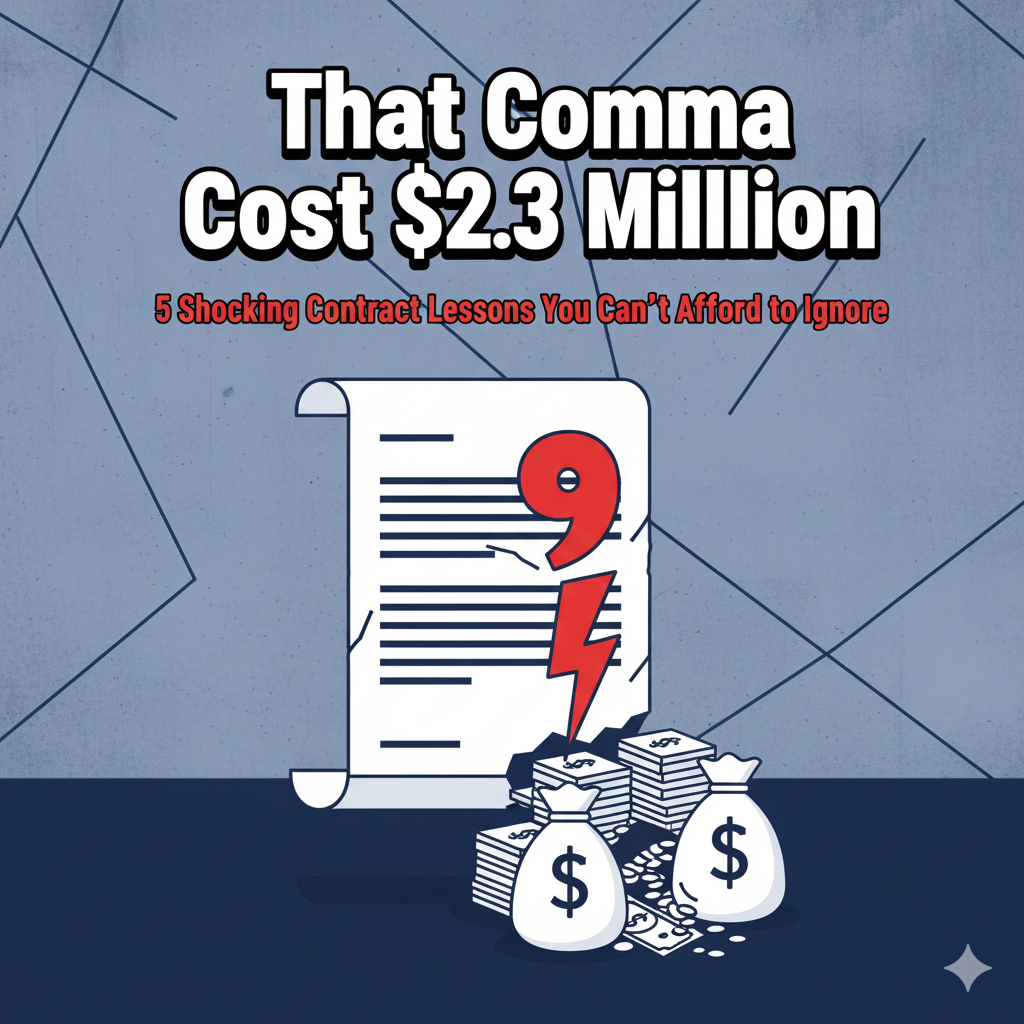Listen to this post: That Comma Cost $2.3 Million: 5 Shocking Contract Lessons You Can’t Afford to Ignore
You’ve just landed a dream client. The contract is in your inbox. You scan it, everything looks standard, and you click “sign.” But what if that standard-looking agreement contained a hidden clause that could bankrupt your business? What if you just agreed to work for free?
In the rush to close a deal, entrepreneurs often sign contracts without a full understanding of what’s lurking in the fine print. You assume the terms are sound and the details are just formalities. But they’re not. This article will reveal five real-world examples of contract mistakes that led to massive financial and operational disasters. These aren’t just theoretical nightmares; they are cautionary tales that prove how a single word, a missing clause, or a simple misunderstanding can put your entire business at risk.
A Single Punctuation Mark Can Cost Millions
Imagine the shock when a major Canadian telecom company’s legal team realized their multi-year agreement could be torn up tomorrow—all because of a single, misplaced comma. In a dispute over when one party could terminate their contract, the entire conflict hinged on that one punctuation error. The mistake allowed one party to end the agreement prematurely, creating a massive financial liability for the other.
The final valuation of this grammatical blunder was staggering: that misplaced punctuation mark was valued at $2.3 million. This case is a powerful reminder that in the world of contracts, there are no small details. Every word and every comma carries immense weight and can fundamentally alter the rights and obligations of everyone involved.
You Can’t Always Enforce an Obvious Mistake
In the classic case of Hartog v Colin & Shields, the defendants offered to sell 30,000 Argentinian hare skins. During all prior verbal negotiations, the price was discussed per piece, which was the industry standard. However, the final written offer mistakenly priced the skins “per lb” instead. Because a single hare skin weighs only about 5 ounces, the written price was less than a third of what the parties had verbally agreed to. The buyer, seeing an incredible deal, tried to “snap up” the offer and enforce the written contract.
The court, however, refused. The judge concluded that the buyer must have known the offer was a mistake, given the prior negotiations and his knowledge of the trade. The ruling was captured in a powerful statement from the judgment:
“…the plaintiff could not reasonably have supposed that that offer contained the offerers’ real intention. Indeed, I am satisfied to the contrary.”
This is a crucial, if counter-intuitive, lesson. While a signed contract feels final, the law generally prevents one party from knowingly and unscrupulously taking advantage of another’s clear and obvious error. But while the law can protect you from an obvious typo, it won’t protect you from being outmaneuvered in a battle of paperwork.
The “Last Shot” Wins the Contract War
It’s a common scenario: you send a quote with your standard terms and conditions, and the client replies with a purchase order that includes their own T&Cs. This clash is known as the “Battle of the Forms,” and the outcome is often decided by the “last shot rule.”
This rule states that the terms of the party who sends the final document before performance begins will typically govern the contract. For example, Leila, a coffee bean supplier, sends a quote and her T&Cs to Tom, a cafe owner. Tom responds with a purchase order referencing his conflicting T&Cs. If Leila then ships the coffee beans without objecting, her action is seen as acceptance of Tom’s counter-offer.
This means Tom’s terms—the “last shot”—win. Understand this: by simply shipping your product, you may have legally signed and agreed to the customer’s contract, not yours. Your actions can override your intentions, locking you into unfavorable conditions you never meant to accept.
Fine Print Can Turn Termination into Financial Ruin
A lawyer on Reddit shared one of the most dangerous clauses they had ever seen, hidden in the fine print of a contract between a large company and a smaller vendor. A subsection of the termination clause stated that if the larger company terminated the agreement for even a minor breach (something as simple as missing a deadline), it would not be responsible for paying any outstanding invoices.
For a smaller vendor, this is catastrophic. Since large companies often delay payments for three months or more, a termination could mean the instant loss of a full quarter’s income, potentially driving the vendor into insolvency. This creates a dangerous power imbalance. As a UK government guidance note on risk allocation states:
“If a supplier is put in a position where they are managing an inappropriate balance of risk then the outcome is highly likely to be poor value for money, underperformance against the core contract objectives, and/or an onerous contract which could ultimately lead to its collapse.”
This example proves that contract clauses are not just legal formalities. They can be weaponized with devastating financial consequences, turning a simple contract exit into financial ruin.
A $50 Template Can Be Your Most Expensive Mistake
Thinking about saving money with a cheap online contract template? Consider the story of one business owner who did just that. In need of a contract for a deal, they downloaded a generic, $50 template from the internet. It looked official enough, covering the basics.
The problem wasn’t what was in the contract, but what was missing: a critical indemnification clause. This clause would have determined who was responsible for losses if things went wrong. A few months later, the deal collapsed. Without that protection, the business owner got stuck with the bill. The result was a legal battle that cost nearly $50,000 in fees.
The lesson is clear: the initial price of a contract is irrelevant compared to the protection it provides. Cheap, generic templates often lack crucial protections, fail to account for state-specific laws, and can create catastrophic financial exposure. That $50 “deal” can easily become your most expensive mistake.
Are You Sure You Know What You Signed?
From a misplaced comma to a weaponized clause, these stories reveal a single, overarching truth: the details matter. Proactive legal review and a careful understanding of your agreements aren’t trivial expenses; they are fundamental investments in your business’s protection and stability.
After seeing what can go wrong, what might be hiding in the last contract you signed?













